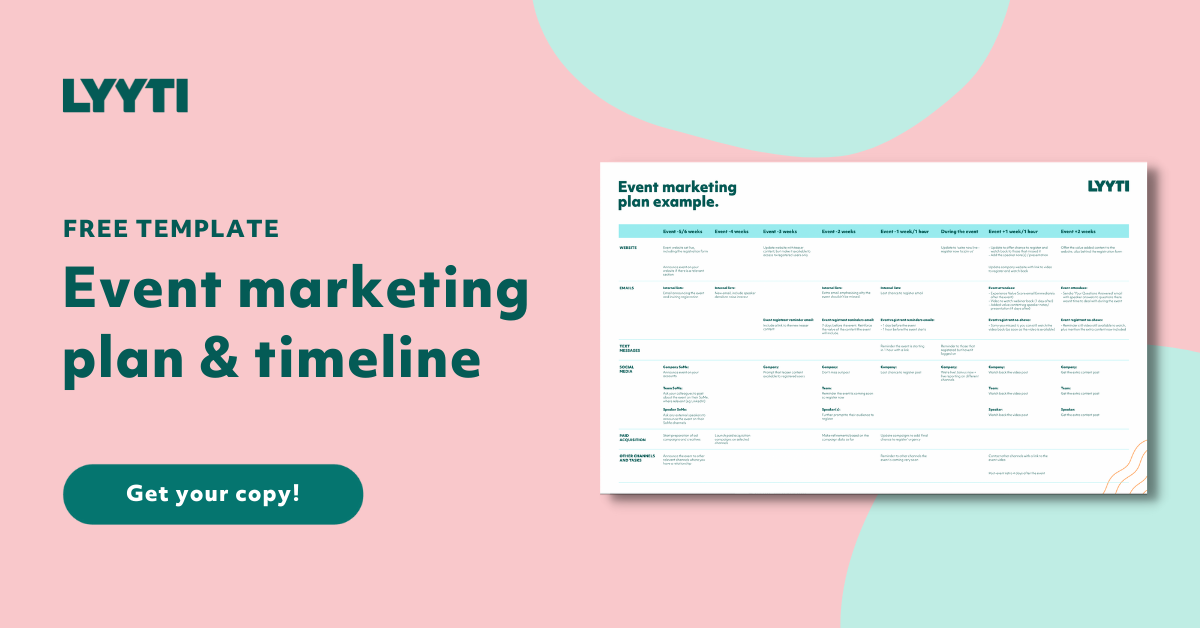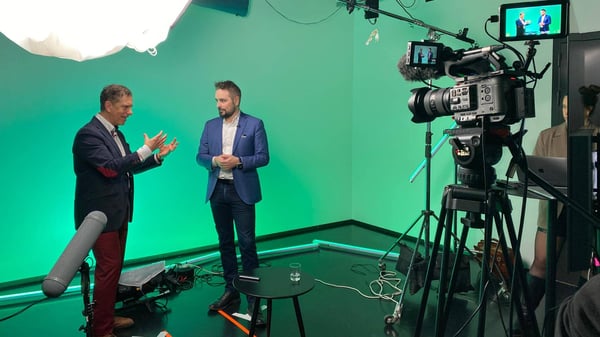You’ve decided to organise an event, you’ve settled on what type of event it will be, understand its purpose, and know how to deliver it. In fact, you’ve been through all the stages of the Ultimate Guide To Successful Events. You’re ready for the big step of creating the event marketing plan, only you aren’t too sure where to start.
Put simply, one size does not fit all when it comes to marketing your event. Some actions may be consistent from one event to another, but it is key to understand your potential audience and customise your efforts to reach them better.
All that said, it’s good to start from a strong base which is where working from an example event marketing plan can give you a head start.
The stages of an event marketing plan
You can divide your activities into three distinct phases: pre-event, during the event and the post-event steps.
That’s the first thing to keep at the front of your mind. Event marketing isn’t only about driving registrations but can also be used to promote specific activities taking place during the event and to check with attendees after it’s finished to measure its success, along with any follow-up product marketing efforts.
Marketing tasks as part of the planning process
When you start planning your event, the marketing plan should also be created but try to be realistic with time and resources. When possible, include some contingency options in case things don’t run smoothly or you don’t get quite the response you were expecting.
Event marketing costs may be hard to quantify if it’s a first-time event. Remember your plan is there to help you and the event. Whilst it isn’t set in stone, be sure to justify any changes you make.
Pre-event marketing
Whether you plan to do some content marketing for events or stick to more traditional approaches, understand the channels and tactics that are most appropriate to you. These could include:
- The event website - you need this to both promote your event and be ready to accept registrations in time
- Email marketing - your lists, speaker lists, partner lists etc
- Social media marketing - your contacts but also leverage the contacts of any speakers
- Online paid advertising - whether the best channel is on Google, LinkedIn or elsewhere, when you understand your audience, this can be an effective way to reach them.
- Community outreach - If your potential attendees gather in a particular online community, is there a way to inform them about your event without coming across as spammy?
- Nurture campaigns - Keep those that have registered engaged with regular updates and reminders about the event.
Depending on the scale of your event and the resources available, you may want to expand further on that list or restrict yourself to only some of the options. The important thing is to identify those early so you can plan them accordingly.
Marketing during the event
As the event is taking place, your marketing should be concentrating on pushing activities happening as part of the experience. Data segmentation is important here so that you can deliver appropriate messages. This is especially the case if you are holding a hybrid event. It wouldn’t be a good experience to send a text to remind everyone about a live networking breakfast if some are attending remotely!
Text messages and email campaigns are your main options here, although social media can also be utilised to highlight ‘as they happen’ moments. By using a well publicised event hashtag, you can ensure you reach and engage your audience.
Marketing tasks post-event
As soon as the event is complete, you should have an email scheduled to request the Experience Value Score to begin the process of rating and improving.
Then your follow up tasks begin, although these can vary widely depending on the event type. For example, if your event was a webinar, your schedule may include:
- An email to all attendees that showed thanking them for their participation with a link so they can watch back the webinar
- An email to the attendees that missed the webinar with a link so they can watch it on demand
- A further email with follow up content, perhaps speaker notes or downloadables related to the topic
- An email with answers to all the questions submitted at the webinar
- A final follow up email with an invitation to connect with one of your sales team to talk further about the solution discussed in the webinar
- There will still be opportunities outside the registered audience, so you could, for example, create a piece of gated content based on the event and keep your pre-event promotional activities live but now promoting that.
- Make sure to keep your company colleagues updated with what has taken place since they may also find value in the content.
This process would look very different for a live customer conference but can act as a starting point to generate ideas.
Event marketing timeline
As part of your strategy phase, you should establish the appropriate timeline needed to market your event. You may only need activity over a few weeks for a small event, but something larger could need a campaign that launches different activities over months.
Take for example a webinar promotion; the pre-event marketing tasks are limited to six weeks before it starts. However, there are regular campaigns to deliver as part of event marketing, so it’s important to ensure you have the resources available to fulfil them.
Roundup and conclusion
The number one thing to take from this is planning. An event marketing plan example is a great place to start, but you must allow yourself time to create an effective strategy. Don’t forget you can learn a lot more about running events that work from the Ultimate Guide To Successful Events.
Event marketing is a challenge of organisation and execution. The event tools that Lyyti offers can ease that burden and make the whole process much smoother. If you want more ideas and tips, download our Event Marketing Playbook.
Download the event marketing plan example
If events are completely new to you, or you simply want a different perspective, it’s always helpful to have a template to reference. That’s why we’ve made this simple event marketing plan template available for you to download.
It’s focused on a small, live event run for a product that already has a group of customers familiar with its offering. Download and customise it to suit the needs of your event.
Hero photo by JOSHUA COLEMAN on Unsplash









